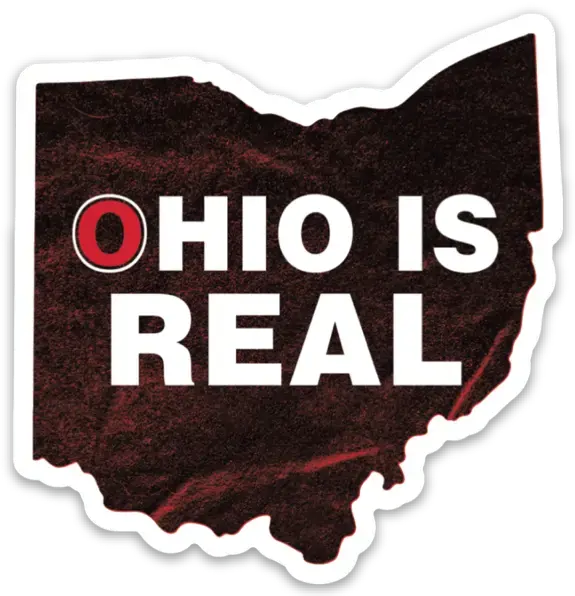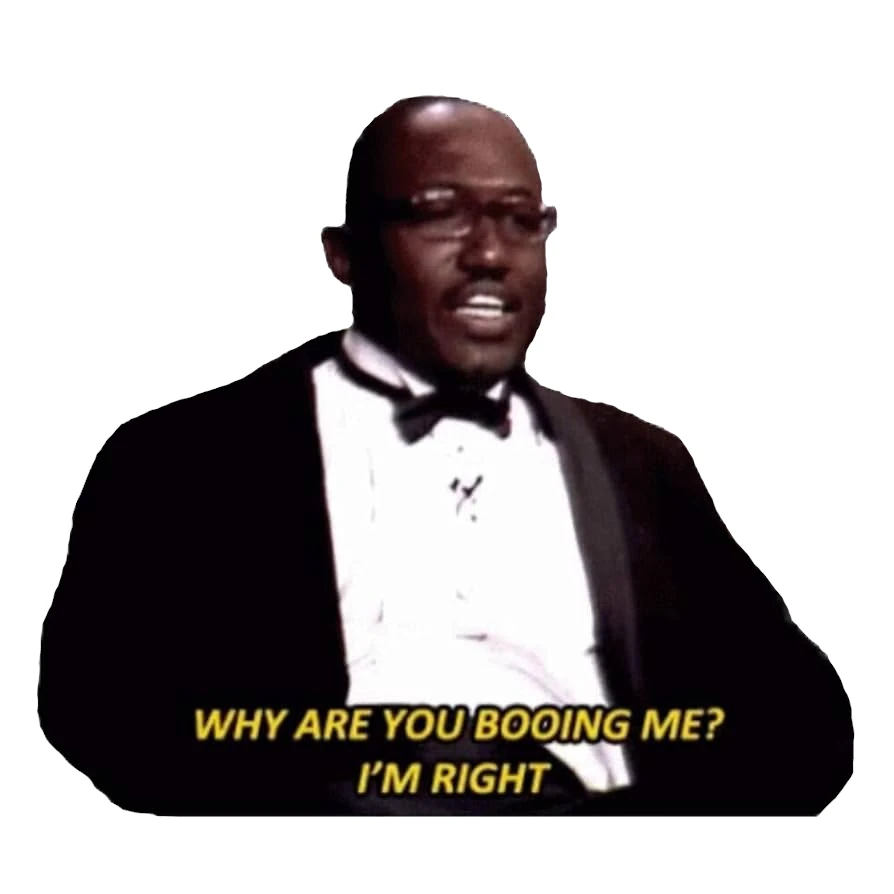I don’t know why people buy shampoo when real poo is free.
Nougat
- 9 Posts
- 848 Comments

 1·19 hours ago
1·19 hours agoExactly. This is the best I’ve got. I could be so much worse.
“Structured” refers to the query language.

 112·1 day ago
112·1 day agoI know who I am.

 1340·2 days ago
1340·2 days ago“You’re not wrong. You’re just an asshole.”
I made my peace with that a long time ago.

 38153·2 days ago
38153·2 days agoWhich IA failed to do, which is why they got sued, and why they can’t lend those publishers’ books at all anymore.
I have no sympathy.
I worked in IT for a company that did the warranty financing for about four months many years ago - so I wasn’t directly involved in the scamtacular stuff. There were actually two sides to that business. The commercial warranty financing was legit: businesses that needed to have warranties on expensive construction equipment (for example) would finance through us, because those policies were expensive.
Once I figured out exactly what was going on on the consumer warranty financing part, I was looking for another job. And then some other company came in and bought the consumer part, lots of people got laid off, and while I was not one of them, it hastened my exit.
The whole thing on the consumer side is just barely this side of legal, but it is most definitely not ethical. Most of the people who were on the hook for these policies were just being preyed upon and squeezed for money. Lots of elderly, lots of lower income people just looking for something to protect themselves, lots of people with mental health issues.

 37·2 days ago
37·2 days agoHow many of the rest of us get to appeal our four month prison sentences to the Supreme Court of the United States of America with any expectation that they would hear the case?

 13·2 days ago
13·2 days agoThis is a little bit before, but a story worth telling (again).
In 1995, I got AOL. Of course, this was in the days where only dialup existed, and when AOL was not flat rate, but charged extra for any time spent online over 30 hours a month. I had some bills.
My 486 computer had a 14.4Kbps modem in it, which I decided I would upgrade to a 33.6Kbps. This was the fastest I could get at the time. Surely, I would enjoy this new superfast speed, right?
No, no I would not. I noticed that I was only ever connecting at 2400 - and this was when the “standard” for dialup was 14.4. AOL advertised 28.8 at the time, as I recall.
I tried all manner of modem strings to try and get my fancy 33.6 to connect to AOL at any speed higher than 2400, to no avail. I spent hours waiting in line in their “support” chat rooms (which I later learned were staffed by unpaid volunteers who may not have known anything about anything). Then I finally decided to try using the toll-free 800 number (which AOL charged a premium to use).
Bang, connected at 14.4Kbps. Back to my local number, 2400. … Wait what? Okay, then it’s not me, it’s them.
I did even more digging to discover that AOL only offered “high speeds” in certain metropolitan areas. AOL numbers local to me were not included in any of those, so I got 2400bps, because that’s all AOL would give. And by this time, the “standard” for dialup had jumped to 28.8Kbps.
All of those super high AOL bills from before (they’d since moved to flat rate unlimited) were exacerbated by “downloading art” at 2400bps.
I immediately went to the grocery store, bought a computer magazine, thumbed through it until I found a regular old ISP (Netcom), and called them on the phone to sign up.

 3·2 days ago
3·2 days agoDidn’t Plato ascribe some of his own “parables” to Socrates? The story we are told is that “this story was told by the History Man”; perhaps that detail is part of the story?

 4·2 days ago
4·2 days agoI am so onboard with them being folklore, especially as “further out” from events we get. I mean, even Fury Road was basically apocalyptic Fantastic Mr. Fox.
OG Mad Max - pretty “accurate” in its telling, pretty directly based in “fact” (in-universe fact), but sets the stage of legend with Max as the one who actively seeks to exact “justice” in a world where justice is fading.
Road Warrior, definitely a little more “legendary,” Max comes out of the wasteland to rescue a settlement in a blaze of glory, and returns to the wasteland from which he emerged.
Beyond Thunderdome, more fantastic with the pig shit factory and the Thunderdome and the gulag and the train and the kids.
Tell me you have a Pentastar without telling me you have a Pentastar.
If that’s the engine we’re talking about, the oil cooler and filter housing assembly is made of plastic, and it’s under the intake manifold. Aftermarket replacements (Dorman) are all aluminum and do not have this issue.
Doesn’t look like I’m able to edit the URL, but thank you.
Who wants to hear all about why that extended warranty industry exists? Because I know.
Okay, a couple of votes, here goes.
First, let’s talk about what an extended warranty is. It is an insurance policy. There is a deductible. The amount you pay for this policy is the premium, just like any other insurance policy. When something breaks on your car, you make an insurance claim. This may be “you pay for the repair, parts and labor, and then make the claim yourself”; it can also be "the shop gets authorization from the
warrantyinsurance company, and proceeds with the repair, then the check for the claim goes directly to the shop (with you paying the shop directly for the deductible and whatever the insurance company didn’t pay for).Sounds like a kind of good deal, right? Insurance to pay for car repairs, just like you have insurance to pay for healthcare. Hold your horses.
There are two kinds of automobile extended warranties: inclusive and exclusive. An inclusive warranty only covers items included on a list of covered items. These are generally bad, because the list of items covered is generally things that aren’t going to fail anyway, or if they do, will not cover necessary associated parts or labor, which makes it less likely that an owner would complete the repair work. Generally, things like “hoses” are not on the list, which gives the insurance company the power to deny coverage of an air intake “hose” or a power steering “hose” or an AC refrigerant “hose” – even though those things (and frankly regular old coolant hoses anymore) have very long lifespans.
An exclusive warranty covers everything not on a list of items. These kinds of coverages can be all right, as the list of non-covered items generally specifies wear and maintenance items. If you are buying a car from a dealership, new or lightly used, you may be offered such a policy, and it may be suitable for you - but read all the details in the contract.
The shady spam call extended warranties will always be inclusive policies, and they are never worth buying.
That’s it, right? Scammers sell shitty policies and avoid paying claims? Nope, we’re not done yet.
Remember how these are insurance policies? Just like homeowners insurance, comp/collision/liability insurance, if you cancel the policy before the term is up, you get a prorated amount of money back from the insurer. If your policy costs $1000, and the policy is for five years, and you cancel after 2.5 years, you get $500 back. Since these are insurance policies, you can do that with these extended warranties as well, but that is never advertised. Keep that bit of information about cancelling in the back of your head for now.
So a scam caller gets a mark on the phone, gets them half interested in this “extended warranty” (by failing to identify it as an insurance policy and by overstating what it actually covers). But the mark doesn’t have $2500 (they’re always way too expensive). Not a problem, you can make monthly payments! All you have to do is pay 10% now, then small monthly payments for … kind of forever! This is called financing.
One, when you finance an extended warranty, you’re paying interest on top of the premium, because you are essentially taking out a loan to pay the full premium cost, and then paying off that loan. The scammer transfers you to their “finance department” to finalize everything. This is probably an entire different company which only finances extended warranties. (I worked for one, briefly.) At no point do you ever find out that you are taking out a loan. They don’t pull credit, you don’t have to “qualify” beyond paying the 10% right now. Why is that?
Remember about cancelling and getting refunded? The loan is collateralized with the insurance policy. You pay the 10% right now, and if you never make another payment, the lender simply cancels the policy, and the lender receives the refund for the unused portion of the policy term. And they’ve made at least some profit, because that 10% “down” covers more than the first several months of policy payments. Every additional loan payment is 100% gravy for the lender, so they will run their own in-house collections department (probably one or two people) who will call and angrily harass the mark incessantly.
Scam caller gets their “commission” for selling the policy, insurance company gets paid for some amount of policy term (which probably hasn’t had any claims made against it), loan company gets some profit from their “efforts,” and the mark is out at least $250 and gets collections calls for the rest of their life.

 9·2 days ago
9·2 days agoOh I’m sure. When I was in Catholic elementary school in the late 70s and early 80s, there was still a paddle on display in the office. Whether it was still put to use or not, I can’t say, but as children, it was pointed out to everyone, and we all feared it. The administration actively failed to dispel any myths about it, so even if they weren’t still beating children with it physically, they still were mentally.

 16·2 days ago
16·2 days agoGestures broadly

 2·3 days ago
2·3 days agoI think that’s a good idea, and you might consider a subscription to a news-adjacent magazine, like The Atlantic, Salon, Vanity Fair.
One of the things that I do is organize my Freetube subscriptions into interest categories. Motoring, Academia, Whistler (the Simon Whistler Empire of Channels is pretty darn good), some others. That way, I can go put information into my head without it being every single news outlet video clip.
I also pick exactly one place to interact in comments sections, and right now that is fediverse. All other internet comments are dead to me.
I refer you to the comment you replied to:
I said exactly what I meant, nothing more, nothing less. Whatever you’re reading into that is on you.

 41·3 days ago
41·3 days agoThe Palo-Alto-based SuperPAC, backed by tech giants like Facebook co-founder Dustin Moskovitz and LinkedIn founder Reed Hoffman, is raising at least $10 million to help better understand the algorithms that help Trump and his allies dominate vertical video platforms.
“Is raising.” That’s their goal, not what they have raised. Headline is misleading.









Palestine being a wholly recognized nation with borders would make it so much easier for the world community to use its leverage on both Israel and Palestine for any of their shenanigans. As it stands now, it’s still arguably “an internal conflict.”
That’s a lot different from “attacking a sovereign nation.”